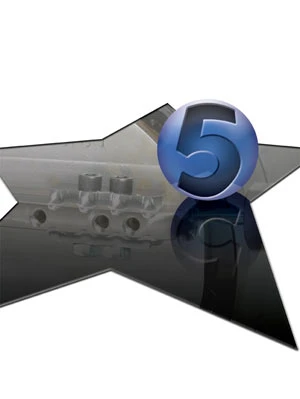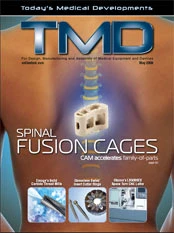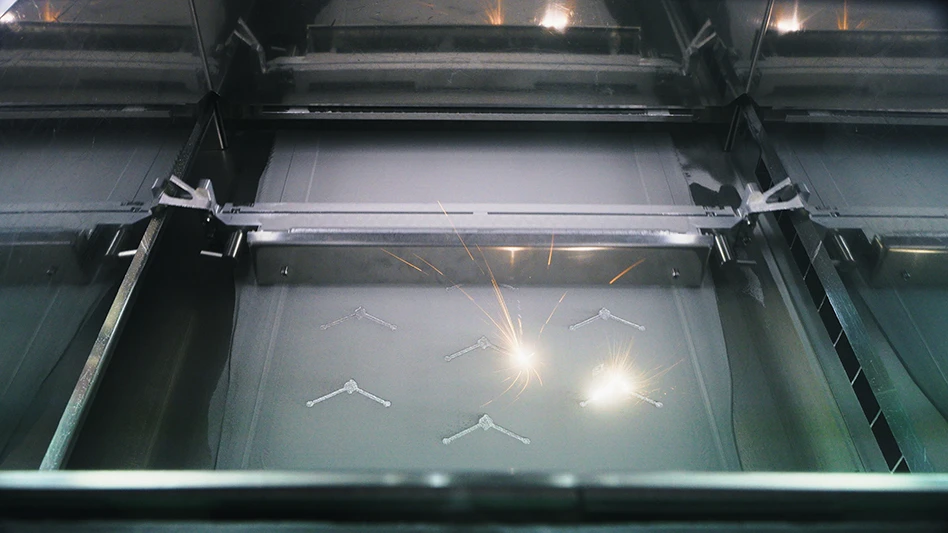
It is not typical for a shop to purchase equipment before winning a contract requiring it. On the other hand, Brown Precision Inc. (BPI) isn't a typical shop. BPI specializes in machining precision 5-axis parts. But that's not what they are most proud of – it's their ability to anticipate their customers' needs. BPI commits resources to technology, often purchasing a new machine before having any jobs requiring that technology, in an effort to forecast the potential parts their customers might need. In order to further this forward-thinking business strategy, BPI requires technology partners with advanced technology and applications know-how to get them up and running quickly.
Tackling Complexity
Founded in 1964, the Huntsville, AL, company started out as a machine job shop under the name of SEMCO Inc. In 1986, Roland Brown bought the company. His son, Daniel Brown, is currently serving as president, and his other son, R. Greg Brown, serves as vice president. Over the years, BPI has grown and expanded toward a production environment specializing in complex 5-axis machining, which has recently led to the machining of complex medical parts.
"We will sometimes machine parts ahead of our customers' needs just to see if we can do a particular job," says Shannon Pell, vice president of engineering at BPI. "We want to be a leader in technology and are not afraid to invest to succeed. We often commit our own resources just to learn how to machine a particular type of part, or in order to have success working with a certain material."
Ten engineers on staff serves them well when collaborating with customers before and during the manufacturing process. "The engineering and technical side of a project is a big competitive advantage for us. The parts we run require high-level technical and expertise," says Pell. "By having a great staff, we can continually come up with ways to produce complex parts.

Machining on the a61 allow BPI to continue to get into tight spots at tight angles.
"And we only want to do the complex projects – nothing just square or round. We like odd shapes with free-form surfaces, tough angles machined in tough materials. Anyone can do the easy stuff.
"Our customers come back to us repeatedly, a fact we're very proud of. We're known for our commitment to customer needs, and this has been a prime objective of Brown Precision for over 40 years. Our focus centers on the concept of timely response to a customer's manufacturing needs. We back up our promise of customer satisfaction with the equipment, skills, responsiveness, and people necessary to build to customer needs and standards," says Pell.
"We don't want to learn how to cut a material or certain part-type on the customer's dime. We need to do it right the first time. Then we want to be the customer's go-to source for these complex parts. For us, it's about service to the customer and doing the job right."
This close customer relationship also allows BPI insight into the parts that are in their future, so that BPI can anticipate what machines and expertise their customers will require.
Medical Parts Success
BPI wanted to expand into the medical market the "right" way, and the things they learned machining 5-axis aerospace parts has served them well in machining complex medical parts of forged stainless steel or high-strength titanium.
They knew they needed and wanted high-performance, capable machines for runs of 50 to 200 pieces – depending on the customers' needs and prototypes. They also wanted the ability to use horizontal machining centers interchangeably for the large family of similar parts they manufacture.
One of BPI's first medical jobs was to manufacture a plate used to hold together broken bones. This part required 316 forged stainless steel – a tough material that's not easy to machine, especially in roughing, where cutting conditions must be monitored closely.
The first parts that they ran on competitive machines were difficult and did not meet the specified geometries. Much trial and error on these competitive machines led to many scrapped tools and a lot of wasted steel in trying to make the part.
"We needed more precision, better speed, and improved cycle times," says Pell. "We wanted to be at the forefront of technology. Makino had the advantage with their process technology and knowledge, and that's one reason we choose them.
"We also knew that we needed Makino's Super Geometric Intelligence (SGI) to run big programs with a lot of code. The machine had to be able to hit many points quickly, and we wanted the parts to come right straight off of the machine. Tool marks or imperfections would not be acceptable."
Since a rigid, accurate machine was needed, BPI purchased a Makino a61 horizontal machining center to assist them on these medical parts. Originally, the bone plates took several setups to get right. Now with the a61, BPI can do the part in one set up.

This plate, used to hold together broken bones, is manufactured out of 316 forged stainless steel.
The 5-axis machining on the a61 allows BPI to continue to get into tight spots at tough angles on these precision parts. Through-spindle coolant evacuates the chips as the machine performs fine-thread milling. Twentysix tools are used, from a ¾" to 0.062" endmill. And the pallet changer allows the part to run constantly.
"Makino got us there. With this a61 machine, we saw a 40% improvement in cycle time on this part alone," says Pell. BPI's first prototypes led to more work, and now business is booming.
"This part opened the door for BPI to show what else we might be capable of," says Pell. "It allowed us to prove our abilities in 5-axis machining of medical parts to many of our customers. This is the kind of part that others struggle with. Now doing these types of parts is common for us."
Setup and Training
To select the Makino machines, BPI worked with Single Source Technologies (SST) for local support and service, training, and continuing implementation of new processes and equipment. This ongoing relationship has served them well.
"SST ran the demos of our bone plate part to help us select a machine tool vendor," says Pell. "Makino came back with the best results – the part was right the first time. SST and Makino devoted the resources and applied the technology to get it right.
"Currently, SST helps us decide what technologies will meet future customer needs. They give us options and ways to tackle these needs with various machining solutions. Their local service crew is easily available and nearby. We love that the applications people can help us figure out the next best thing. Local support is especially important because our parts change often and we need to make adjustments," says Pell.
"Brown Precision is a very capable shop," says Jack Nash at SST. "We're just glad we can help them plan for the future with new capabilities."
BPI also used Makino's online training, which worked out well for them. "Bringing someone in for training can sometimes slow down production and distract the shop," says Pell. "The Makino online training got us up to speed quickly, allowing us to learn many new machining operations at our own pace. Some employees trained while on the floor machining other parts, and some trained on their own time."
Continued Investment
The success BPI has seen has encouraged them to purchase additional Makino machines. In addition to the Makino a61 horizontal machining center, BPI has several Makino a51s. Both types are used to machine the stainless steel bone plates. The a51s were configured with optional rotary-on-rotary table configurations in order to generate full 5-axis capability.
BPI uses mostly 3+2 machining because of the rigidity it provides. Usually BPI runs one part at a time. There are quick-change pallets, and BPI makes their own tombstones, riser plates, and fixtures. In addition, BPI has two new Makino S33 vertical machining centers with pallet changers and has plans to continue to phase out their older vertical machines with even more 5-axis models.
BPI also has purchased a Makino SP43 wire EDM machine. "The Makino wire EDM is sometimes used to protect spindle time in the horizontal machines," says Pell. "We use the SP43 to EDM while the horizontal machining centers are cutting. The SP43 has been used to knock out notches and to reduce roughing.
BPI's most recent purchase is the Makino EDGE2S Ram EDM machine. This was installed to assist with the medical instrument parts – one area that BPI thinks their customers will need in the near future. "We will use the EDGE2 for parts that are difficult to mill, for screw features, and for odd pockets that require the precision of the Ram EDM," says Pell. "We purchased this machine because we knew our customers needed complex medical instruments that require a Ram EDM. We plan to fine-tune our performance with the Ram EDM and then go after that business. This is just another example of how Brown Precision is always diversifying and thinking ahead to be ready for the next best thing."
Though Brown Precision anticipates more growth potential in the medical arena, they are determined to stay agile. The company has plans to expand from 36,000 to 50,000 square feet this year. With this physical expansion come new jobs, new machines, and plans to increase capability for fabrication and machining composite materials.
Though these plans help BPI stay on the cutting edge of technology with the newest precision capabilities – a key to their success – their successful business model will remain the same.
"We want to have the ability to fulfill big production machining contracts but also meet customer needs doing prototype work, short runs, etc." says Pell. "We never want to lose the jobshop attitude and agility."

Explore the May 2008 Issue
Check out more from this issue and find your next story to read.
Latest from Today's Medical Developments
- HERMES AWARD 2025 – Jury nominates three tech innovations
- Vision Engineering’s EVO Cam HALO
- How to Reduce First Article Inspection Creation Time by 70% to 90% with DISCUS Software
- FANUC America launches new robot tutorial website for all
- Murata Machinery USA’s MT1065EX twin-spindle, CNC turning center
- #40 - Lunch & Learn with Fagor Automation
- Kistler offers service for piezoelectric force sensors and measuring chains
- Creaform’s Pro version of Scan-to-CAD Application Module





